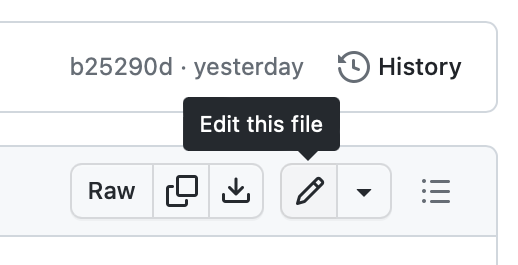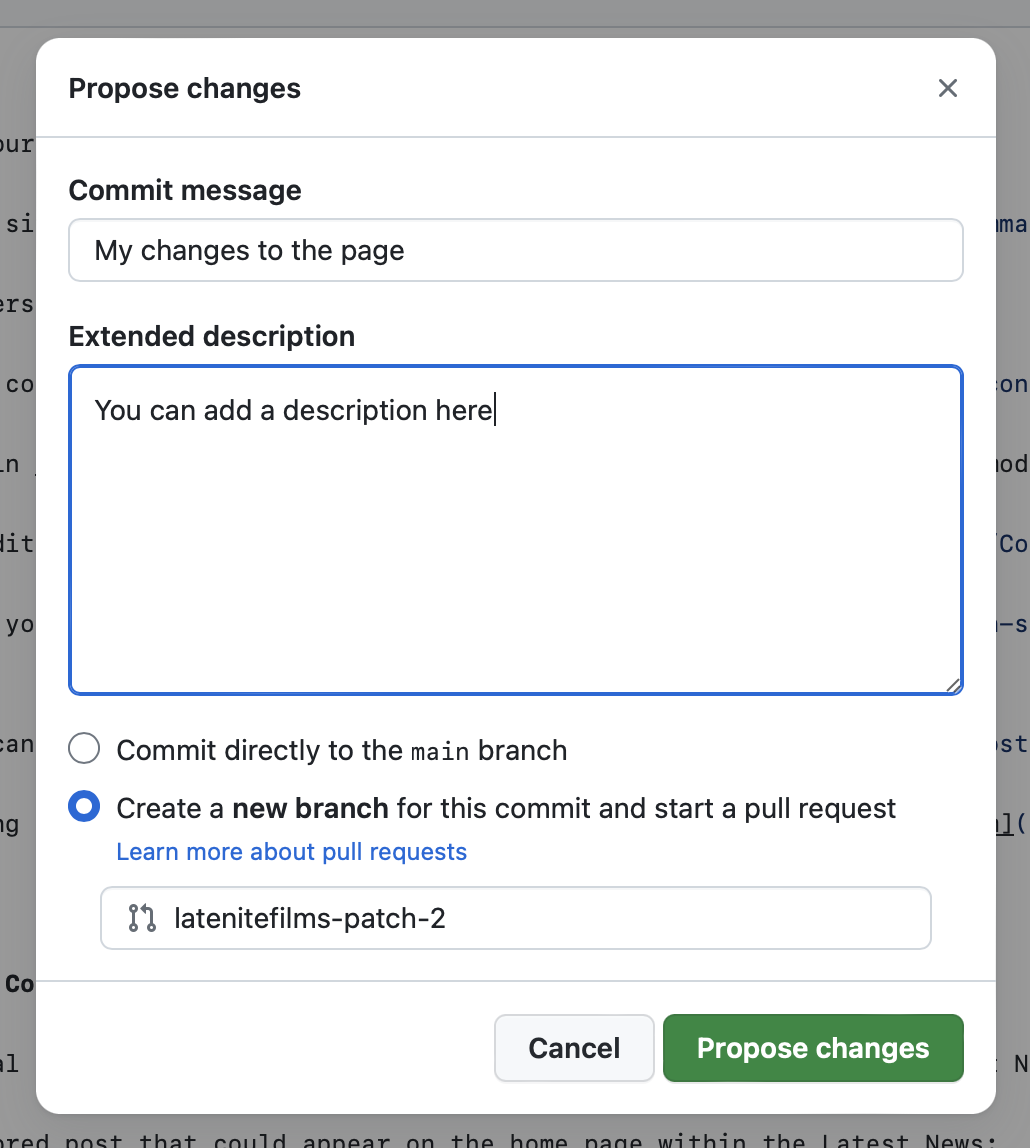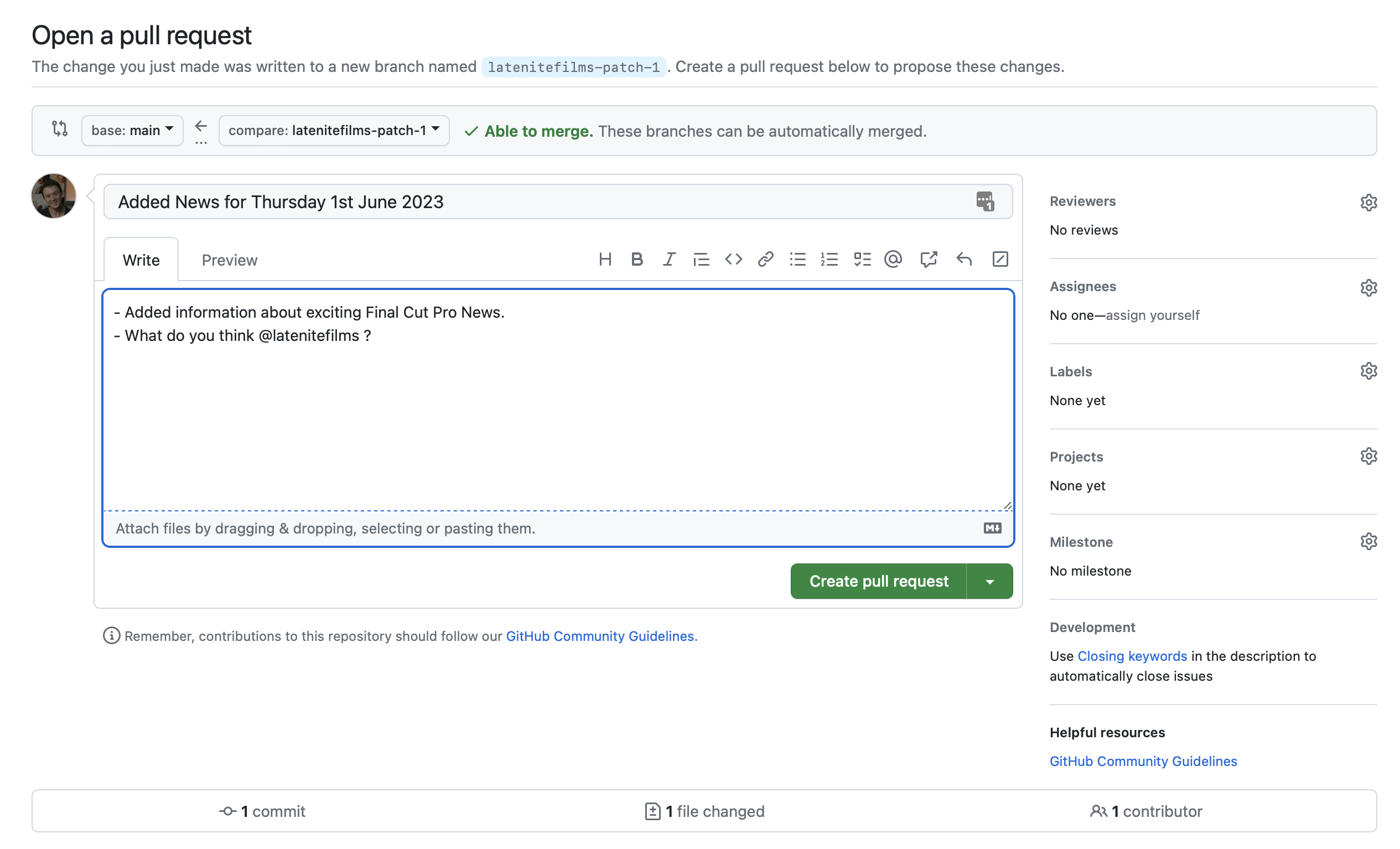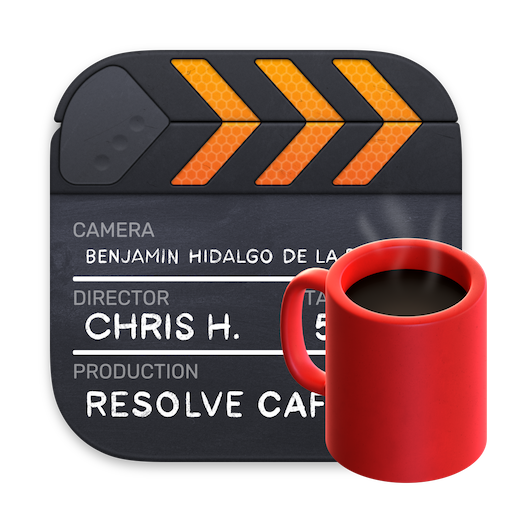#
Contribute
Resolve Cafe is entirely open source and hosted on GitHub.
GitHub is a safe and secure developers platform used by over 73 million users worldwide.
You can make changes to the site by submitting pull requests on GitHub.
We welcome and encourage users submitting their own case studies, articles, products and news items.
You can see all the current contributors here. Everything is tracked and archived on GitHub.
The entire site is written in Markdown, so it's very easy to modify and update without necessarily knowing any HTML or code.
The website is build on Retype, which has a lot of power and flexibility, so you can easily add all kinds of components just using Markdown.
However, if you're not confident using GitHub, you can also email us content here: support@latenitefilms.com
#
Our Mission
We want this site to be:
- Open: This site will remain open-source on GitHub for anyone to suggest pull requests
- Up-to-date & Relevant: We want this site to always be up-to-date and relevant
- No bullshit: We want this site to be honest, truthful, useful and professional
- Community Driven: This isn't our site, it's "owned" by the professional DaVinci Resolve Community
- Modern: This site should work great on the latest browsers, including mobile
- Fast & Clean: This site should load quickly, and be easy to navigate
- No analytics or user tracking: No cookies here!
#
Advertising & Sponsored Content
We're open to promoting DaVinci Resolve products and services on the front page within the Latest News in a clean and useful way.
For example, here's a sponsored post that could appear on the home page within the Latest News:
Sponsored
DaVinci Resolve Studio Scaling Fix: Fix Scaling issues in DaVinci Resolve Studio for FCPX and Premiere sequences imported via XML and FCPXML. Download Now!
Sponsored posts can just be plain text, with a single link. We don't allow images, videos, or other embedded elements.
If you would like to advertise on Resolve Cafe, please contact us to discuss: support@latenitefilms.com
#
What's a Pull Request?
Imagine you're working with a group of friends on a big school project, and you're all adding different parts to it. Now, you're all using the same master copy of the project, but you're all working separately. When you're ready to add your part to the master copy, you don't just want to plop it in there. You want your friends to check it over, make sure it fits with everything else, and then add it in when they agree it's ready. This way, you ensure that everyone's work meshes well together and the project doesn't become a mess.
A GitHub pull request is basically the same idea. When you're working on a shared codebase, or "project," you often work on your own copy, or "branch". When you think your changes are ready to be added to the shared codebase, you make a "pull request". This is a proposal that says "I think these changes I made should be added to our shared project".
Your teammates then can look over your changes, suggest edits, and finally, if they agree that your changes are good, they "merge" them into the shared project. This way, everyone keeps the code clean and organized, and you have a record of who added what and when.
So, in simple terms, a pull request is a way of proposing changes to a shared project and allowing others to review and approve those changes before they're added.
#
Navigating GitHub
To create the fastest website possible, Resolve Cafe is what's called a "static site". It just a collection of HTML files in a folder - nothing fancy.
However, to make sure the website is super easy to update and improve, we use GitHub Actions to "do stuff" to our markdown files whenever we submit a pull request.
For example, each time you make a pull request, our fancy GitHub Action does the following:
- Looks at all the individual Asset Management in this folder, and generates an alphabetical list of them for the Asset Management page.
- Looks at all the individual FAQ in this folder, and generates an alphabetical list of them for the FAQ page.
- Looks at all the individual Fusion Templates in this folder, and generates an alphabetical list of them for the Fusion Templates page.
- Looks at all the individual News items in this folder, and generates an alphabetical list of them for the Latest News page.
- Looks at all the individual Plugins in this folder, and generates an alphabetical list of them for the Plugins page.
- Looks at all the individual Sponsors in this folder, and uses them on the Latest News page.
- Looks at all the individual Tools in this folder, and generates an alphabetical list of them for the Tools page.
- Looks at all the Latest News items and generates an RSS feed
This means, if you want to add a Tool, Fusion Template, or News Item, you can just add a new markdown file in that folder, and once the pull request is approved, everything will be updated automagically.
#
How to Edit Pages
If you're not already registered with GitHub, create a free account.
There's an Edit this page on GitHub link at the bottom of every page.

You can edit the contents of this page by clicking the link at the bottom of this page.
To make changes simply click the little pencil Edit this file button.

You can then make changes in the text editor using the Markdown syntax. Copying and pasting existing syntax is the best way to get started.
You can learn more about basic formatting here.

Once done click Commit changes. You can enter a message and description for the commit. Press Commit changes again.

You will now be presented with a Open a pull request page.
You can add a title and detailed description to the pull request. Once you're done click Create pull request.

This will send your changes to the Resolve Cafe team to review and approve.
If changes are required, they'll add comments within the pull request.
If you have questions, you can ask them on the Discussions board.
You can also email us here: support@latenitefilms.com
#
GitHub Web-based Editor
You can use the github.dev web-based editor to edit files and commit your changes.
Simply replace the .com with .dev on any GitHub URL.
For example to edit this page you can use:
https://github.dev/CommandPost/ResolveCafe/blob/main/docs/contribute.mdYou can learn more here.
#
External Links
All external links should open in a new tab/window.
The trick is to add {target="_blank"} at the end of the link.
Here's an example of how to do this in Markdown:
[Sync-N-Link](/tools/#sync-n-link-x){target="_blank"}
#
Embedded Videos
To keep that site as fast as possible, and free from tracking/cookies, we've decided not to allow embedded videos.
Instead, we'll be posting the Video Thumbnail as a clickable link to the video.
Here's an example of how this looks in Markdown:
[](https://www.youtube.com/watch?v=2VOY70LfA-4){target="_blank"}You can use this website for download YouTube Thumbnails.
#
Images
All images should be stored within the /docs/static/ folder on GitHub.
You can find it here.
#
GitHub Desktop
You can also use GitHub Desktop to essentially "clone" the entire Resolve Cafe website to your local machine.
You can then make changes locally, and once done, submit a pull request back to the main GitHub repository.
You can download GitHub Desktop here.
You can then use a text editor like BBEdit to edit your Markdown files on your Mac.
#
Powered by Retype
Resolve Cafe is powered by Retype and hosted on GitHub Pages.
We've VERY thankful for all the support Retype has given us!
The comments feature at the bottom of every page is powered by giscus.
#
Contributor Covenant Code of Conduct
#
Our Pledge
We as members, contributors, and leaders pledge to make participation in our community a harassment-free experience for everyone, regardless of age, body size, visible or invisible disability, ethnicity, sex characteristics, gender identity and expression, level of experience, education, socio-economic status, nationality, personal appearance, race, caste, color, religion, or sexual identity and orientation.
We pledge to act and interact in ways that contribute to an open, welcoming, diverse, inclusive, and healthy community.
#
Our Standards
Examples of behavior that contributes to a positive environment for our community include:
- Demonstrating empathy and kindness toward other people
- Being respectful of differing opinions, viewpoints, and experiences
- Giving and gracefully accepting constructive feedback
- Accepting responsibility and apologizing to those affected by our mistakes, and learning from the experience
- Focusing on what is best not just for us as individuals, but for the overall community
Examples of unacceptable behavior include:
- The use of sexualized language or imagery, and sexual attention or advances of any kind
- Trolling, insulting or derogatory comments, and personal or political attacks
- Public or private harassment
- Publishing others' private information, such as a physical or email address, without their explicit permission
- Other conduct which could reasonably be considered inappropriate in a professional setting
#
Enforcement Responsibilities
Community leaders are responsible for clarifying and enforcing our standards of acceptable behavior and will take appropriate and fair corrective action in response to any behavior that they deem inappropriate, threatening, offensive, or harmful.
Community leaders have the right and responsibility to remove, edit, or reject comments, commits, code, wiki edits, issues, and other contributions that are not aligned to this Code of Conduct, and will communicate reasons for moderation decisions when appropriate.
#
Scope
This Code of Conduct applies within all community spaces, and also applies when an individual is officially representing the community in public spaces. Examples of representing our community include using an official e-mail address, posting via an official social media account, or acting as an appointed representative at an online or offline event.
#
Enforcement
Instances of abusive, harassing, or otherwise unacceptable behavior may be reported to the community leaders responsible for enforcement at [INSERT CONTACT METHOD]. All complaints will be reviewed and investigated promptly and fairly.
All community leaders are obligated to respect the privacy and security of the reporter of any incident.
#
Enforcement Guidelines
Community leaders will follow these Community Impact Guidelines in determining the consequences for any action they deem in violation of this Code of Conduct:
#
1. Correction
Community Impact: Use of inappropriate language or other behavior deemed unprofessional or unwelcome in the community.
Consequence: A private, written warning from community leaders, providing clarity around the nature of the violation and an explanation of why the behavior was inappropriate. A public apology may be requested.
#
2. Warning
Community Impact: A violation through a single incident or series of actions.
Consequence: A warning with consequences for continued behavior. No interaction with the people involved, including unsolicited interaction with those enforcing the Code of Conduct, for a specified period of time. This includes avoiding interactions in community spaces as well as external channels like social media. Violating these terms may lead to a temporary or permanent ban.
#
3. Temporary Ban
Community Impact: A serious violation of community standards, including sustained inappropriate behavior.
Consequence: A temporary ban from any sort of interaction or public communication with the community for a specified period of time. No public or private interaction with the people involved, including unsolicited interaction with those enforcing the Code of Conduct, is allowed during this period. Violating these terms may lead to a permanent ban.
#
4. Permanent Ban
Community Impact: Demonstrating a pattern of violation of community standards, including sustained inappropriate behavior, harassment of an individual, or aggression toward or disparagement of classes of individuals.
Consequence: A permanent ban from any sort of public interaction within the community.
#
Attribution
This Code of Conduct is adapted from the Contributor Covenant, version 2.1, available at https://www.contributor-covenant.org/version/2/1/code_of_conduct.html.
Community Impact Guidelines were inspired by Mozilla's code of conduct enforcement ladder.
For answers to common questions about this code of conduct, see the FAQ at https://www.contributor-covenant.org/faq. Translations are available at https://www.contributor-covenant.org/translations.
